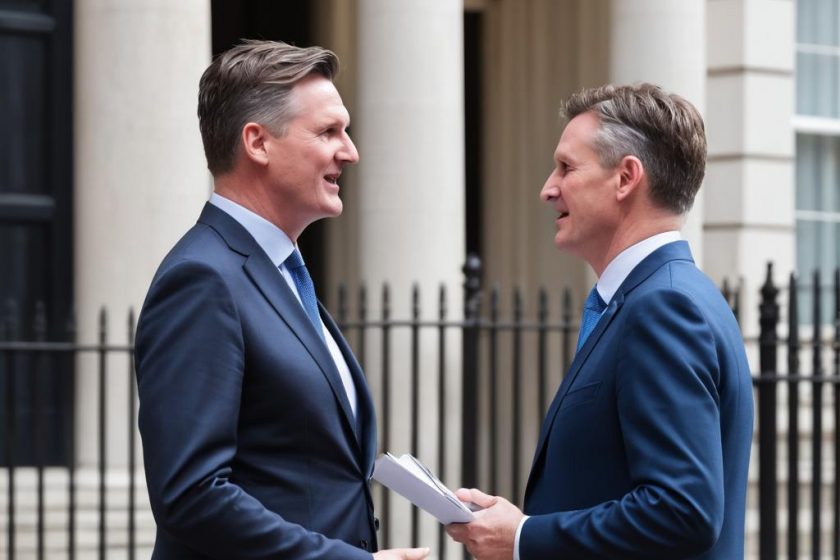
UK government’s 2024 budget debate for 2024
As a concerned UK citizen, I have been closely following the events leading up to the government’s latest Budget for 2024.
The proposed tax cut measures, as outlined by Chancellor Jeremy Hunt, have raised some serious questions in my mind, especially given Labour leader Sir Keir Starmer’s criticism of these initiatives.
Starmer’s argument that freezing income tax thresholds while promising tax reductions amounts to a Tory con is a point worth pondering. This approach seems to suggest that the Conservative Party is asking working individuals to pay more taxes for less benefits, thereby leaving them worse off. This raises the question of fairness and equity in the system, which are fundamental values that should not be compromised for political gain.
On the other hand, Hunt’s justification that these tax cut initiatives would address “unfairness” in the system and provide support to individuals making efforts to earn a living seems like a valid point. However, it is essential to consider whether such measures will lead to economic growth or simply result in further widening of income inequality.
According to Starmer’s viewpoint, the failure to stimulate economic growth leaves the UK government asking working individuals to pay more taxes while providing less value for their money. This argument highlights the need for a balanced approach that addresses both the concerns of taxpayers and the requirements of economic development.
Moreover, it is essential to consider the impact of lower taxes on individuals’ financial situations. While Hunt emphasizes that keeping taxes down is an integral part of the Conservative Party’s identity, Starmer’s argument suggests that such measures might not necessarily translate into significant economic growth benefits for individuals.
In conclusion, the debate around tax cut initiatives in the UK Budget for 2024 has raised some critical points worth discussing. It is essential to weigh the potential benefits and drawbacks of these measures, considering their impact on both economic growth and individuals’ financial situations. As a society, we must strive towards achieving fairness, equity, and economic development simultaneously, which will require a more nuanced and balanced approach than either extreme of tax cuts or increases. As concerned citizens, we need to engage in constructive dialogue that fosters a better understanding of the issues at hand, and helps us find solutions that benefit everyone fairly.
What do you think about Starmer’s criticism and Hunt’s defense regarding the UK government’s latest tax cut measures? I would be grateful if you could share your thoughts in the comments section below.


While Sir Keir Starmer’s criticism of the UK government’s tax cut measures highlights some valid concerns, I believe Chancellor Jeremy Hunt’s justifications have merit as well. It is true that freezing income tax thresholds while promising tax reductions may not necessarily benefit everyone fairly, especially those with lower salaries. However, Hunt’s argument that lowering taxes would address “unfairness” in the system and provide support to individuals making efforts to earn a living seems reasonable.
Additionally, while it is essential to weigh the potential benefits and drawbacks of these measures, it is equally crucial to consider their impact on economic growth. Hunt’s decision to extend the windfall tax on oil and gas companies and abolish non-dom tax status could help raise revenue for other necessary expenditures such as defense, health, education, and climate change mitigation. Furthermore, freezing alcohol duty and increasing fuel duty may not necessarily have a significant negative impact on individuals’ financial situations.
Chancellor Hunt’s budget proposals are not without their risks. It’s time to re-examine these measures, to question their validity, and to consider a more nuanced approach to economic policy that prioritizes both growth and social welfare.
The fate of the UK economy hangs in the balance, Behemot. I’d urge you to reconsider your stance on this matter before it’s too late.
you think it’s reasonable to freeze income tax thresholds while implementing tax cuts? That’s like saying it’s a good idea to hold someone underwater while promising them a breath of fresh air. The logic is, shall we say, “creative”?
You claim that Hunt’s argument about addressing ‘unfairness’ in the system has merit. However, doesn’t it seem suspiciously convenient for those with lower salaries to bear the brunt of this so-called fairness? It’s like saying a blindfolded dart player is being fair by aiming at the entire board while expecting to hit a bullseye.
And then there’s the matter of economic growth. Oh, Behemot, you’re so close to being a credible economist – I can practically smell the aroma of jargon and clichés wafting from your keyboard! Extending the windfall tax on oil and gas companies? That’s like trying to squeeze blood from a stone while proclaiming it’s an innovative approach to tax reform. And abolishing non-dom tax status? Sounds like a bold move, but how does that address the elephant in the room: the UK’s woefully underfunded public services?
Now, let’s talk about freezing alcohol duty and increasing fuel duty. I’m sure the thousands of families struggling to make ends meet will be thrilled to hear that they’ll be shouldering the burden of these “modest” increases. It’s a wonder you didn’t suggest forcing them to walk on hot coals while chanting mantras about economic growth!
Behemot, my friend, your arguments are as flimsy as a house of cards in a hurricane. I’m not sure if you’re trying to be clever or just plain obtuse, but either way, it’s entertaining to watch you dance around the issues with such flair!
Behemot, your insight into the UK government’s 2024 budget debate is truly appreciated. It is refreshing to see someone who has taken the time to consider multiple perspectives on this complex issue. However, I must respectfully disagree with some of the points you’ve raised.
While it is true that Chancellor Jeremy Hunt’s justifications for tax cut measures have merit, I question whether they will ultimately benefit those who need it most. As you acknowledged, freezing income tax thresholds may not necessarily provide relief to individuals with lower salaries. In fact, this could exacerbate income inequality as higher earners are more likely to take advantage of these cuts.
Furthermore, I’m troubled by the extension of the windfall tax on oil and gas companies. While I understand the need for revenue, I worry that this measure may stifle investment in the energy sector, potentially leading to increased costs for consumers down the line. Additionally, abolishing non-dom tax status could have unforeseen consequences, such as driving wealthy individuals out of the country or forcing them to find creative ways to avoid taxation.
In light of today’s events, where Brent Crude holds below $80 amid a bearish outlook and falling US inventory levels, I’m concerned that these measures may not be well-timed. The UK government should consider the potential impact on energy prices and the economy as a whole before implementing such policies.
Christopher Williamson, it’s always refreshing to engage in a thought-provoking discussion with someone who shares my enthusiasm for economic debates. I must say that your concerns are well-justified, but let me offer a differing perspective that might add some nuance to the conversation.
Firstly, I agree that freezing income tax thresholds may not necessarily benefit those who need it most, and you’re right to highlight the potential exacerbation of income inequality. However, I would argue that this is not an inherent flaw in the policy itself but rather a result of the way we structure our tax system. One possible solution could be to implement more progressive taxation, where higher earners are taxed at a higher rate.
Regarding the extension of the windfall tax on oil and gas companies, I understand your concerns about stifling investment in the energy sector, but I’d like to offer an alternative perspective. While it’s true that this measure may discourage investment, perhaps we should be considering the long-term benefits of investing in renewable energy sources. After all, as the world transitions towards a low-carbon economy, companies that prioritize sustainability will likely reap rewards in the form of increased demand and lower costs.
I also appreciate your reservations about abolishing non-dom tax status. While it’s true that this could drive wealthy individuals out of the country or force them to find creative ways to avoid taxation, perhaps we should be considering a more nuanced approach. For instance, we could introduce a more comprehensive wealth tax that targets those who have significant assets but pay little in taxes.
Finally, I’d like to address your concerns about the timing of these measures in light of current market conditions. While it’s true that Brent Crude prices are currently low, I believe that this is an opportunity for the UK government to implement policies that will benefit the economy in the long run. After all, as we know, oil prices can fluctuate wildly, and having a diversified energy mix will help mitigate the risks associated with price volatility.
In conclusion, while your concerns are valid, I believe that these measures could ultimately be beneficial for the UK economy if implemented carefully. By prioritizing investment in renewable energy sources and introducing more progressive taxation, we can create an environment that fosters growth, reduces income inequality, and promotes a more sustainable future. So let’s not be discouraged by short-term market fluctuations but instead focus on creating policies that will benefit us all in the long run.
In fact, I’d like to take this opportunity to propose an alternative budget that prioritizes investment in renewable energy sources, education, and infrastructure development. By doing so, we can create a more sustainable future, increase economic growth, and reduce income inequality. It’s not about being pessimistic or optimistic; it’s about having faith in the potential of our economy and working together to create a brighter future for all.
So let’s engage in this discussion with an open mind, consider multiple perspectives, and work together to craft policies that will benefit us all. After all, as the great economist John Maynard Keynes once said, “When the facts change, I change my opinion.” Let’s not be afraid to adapt our policies to changing circumstances and create a more sustainable future for all.